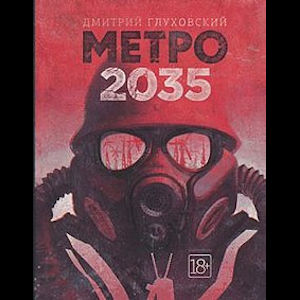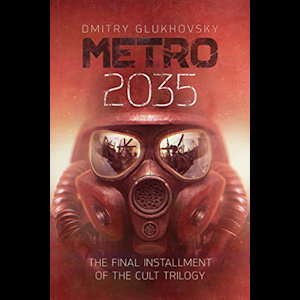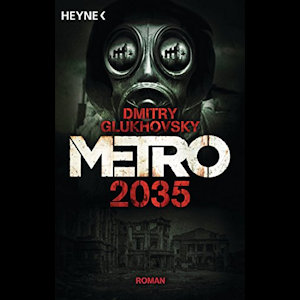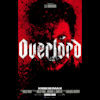Metro 2035 by Dmitry Glukhovsky - Book Review
 | | The original Russian cover |
Artyom is a man obsessed. After helping to destroy the Dark Ones and then spending a year in the Order, protecting the Metro, he has returned to some semblance of a normal life at his old home of Exhibition Station. He is married now, to Miller's daughter Anya, but their relationship has fallen apart. Instead of contributing much to the daily grind and upkeep of the station, Artyom spends most of his time taking trips to the surface with his radio, risking the constant exposure to brutal radiation in the vain hope that somewhere in the world, somebody else is still alive, that there is hope for a life outside of the Moscow Metro. Embittered, shunned by his own people, and losing faith, Artyom is visited by Homer, an old storyteller from the other side of the Metro, who is intrigued by Artyom's experiences and tells him a tale about a radio operator somewhere on the Red Line who was once in contact with a surface-dwelling settlement that survived the war. Artyom immediately abandons his home in search of this radio operator, with Homer in tow, unaware that he is about to uncover some of the Metro's greatest secrets.
When Dmitry Glukhovsky was working on the story for the second video game based on his work, Metro: Last Light, he knew he would have to write another novel. Originally announced as a loose adaptation of the events of that video game, Metro 2035 is more of a sequel, borrowing elements of Last Light as backstory, most notably the seige on D-6 that serves as the game's climax. However, it also completely ignores other elements of the game--especially the orphan Dark One and his fellow survivors in a D-6 vault--making it a little confusing trying to parse out what Artyom's story, between Metro 2033 and Metro 2035, actually is. Anyone who is going into this book without having played Metro: Last Light will be just as confused, because the details of what happened at the bunker are left underdeveloped, despite being referenced dozens of times throughout the novel. This is where the series' convoluted canonicity becomes a serious problem, but it's more of an annoyance than a fatal flaw.
The greatest flaw is actually Artyom himself, at least for the first half of the novel. He has become an intolerably jaded and insufferable character since we last saw him at the top of Ostankino Tower, and the first few chapters we spend with him are marked by his disdain for his fellow human beings, his gross emotional mistreatment of his new wife, his lack of regard for his eternally patient stepfather, his angry dismissiveness of Homer (the kindest and most lovable character in the entire series, who honestly never feels like he fits in properly with this book's story), and his growing madness as he chats with a friend who has been dead for two years. As the book progresses, it doesn't become any easier to connect with him either, as he repeatedly fails to lift a finger for people in need, continues to act like a miserable bastard, does some unbelievably reckless and suicidal things for seemingly no reason, and eventually even cheats on his wife with a prostitute. Until a certain plot twist at roughly the half-way mark of the story, there's little reason to even care about his journey, as the stakes seem unusually low, centered entirely on Artyom's compulsion to chase down every elusive hint of a rumor about life outside the Metro.
 | | The American cover |
To be fair, Artyom's character at least makes sense, from a narrative perspective and considering what he's experienced. That doesn't make him any more likeable, though, and one wonders if the book wouldn't be served far better by having a different, more relatable character take the role of protagonist. For example, with a little tweaking, Glukhovsky could make Anya the main character who goes through many of the same trials and tribulations that Artyom goes through, only instead of doing it because of her own crazed obsession, she's doing it to find redemption for her lost husband. She'd at least be nicer to Homer.
I'm not going to lie: as I approached the novel's midpoint, I was feeling incredibly disappointed. There are intimations of a good story hidden in the background, and there are exciting plot beats to be had, but those first two-hundred-fifty pages are a chore to get through. It's full of the most scathing and unrewarding angsty nonsense, coming directly from Artyom's embittered mind, and everything he experiences only serves to prove that this world he's in is nothing but a cesspool of violence, terror, and inhumanity. There's no beauty, there's no real mystery aside from a bit of political intrigue in the background, and the plot seems held together by the loosest of threads.
It also doesn't help that some of the writing is very awkward. I'm willing to give Glukhovsky the benefit of the doubt and believe something has been lost in translation, but there are a few places here and there--dialogue scenes, mostly, which are often written without attributing lines to their individual characters--where it becomes all but impossible to figure out what is actually happening. This is certainly not a deliberate choice, but from time to time, the writing becomes infuriatingly vague, and the reader is left wondering where the characters are, what they are thinking, and what the implications are of whatever just happened, but Glukhovsky barrels ahead without answering any of those questions. There is one moment where characters suddenly appear on the surface, for example, and there is NOTHING in the preceding pages to indicate that they ever moved from the underground. (I read those pages three times, too.) It takes several more pages to even figure out if the characters are wearing protective gear or not. Despite being the first book in the series to come with its own map, Metro 2035 is, ironically, the first book where it doesn't help.
 | | The German cover |
All that said, things do improve--drastically--in the second half. Artyom eventually becomes a more relatable and redeemable character, and as the underlying mysteries begin to unfold, the entire mythos of the Metro opens up in a big way. There are some truly harrowing scenes--including a long sequence in what amounts to a Nazi labor camp--and the real stakes eventually make themselves known. Glukhovsky still has plenty to say about human nature, and though it's still pretty bleak and nihilistic, there's a core of humanity that shines through near the end, albeit dimly. This book also has the clearest antagonist, a man (whose identity I won't spoil here) who could arguably be the primary villain of the entire trilogy, and when he is finally unmasked, he turns out to be one of the most fascinating characters in a series known for its fascinating characters.
[Spoiler warning: if you don't want to know anything about the book's ending, don't read this paragraph.] I also genuinely love and appreciate the conclusion. It's certainly not a happy ending, all things considered (especially if you think about what will inevitably happen not long after the final pages), but it's the closest the trilogy comes to true closure. Though Metro Exodus looks to be taking some cues from the end of Artyom's journey here, I don't feel like the Metro series needs more story. It's all pretty well laid out, when all is said and done, and Artyom's arc feels utterly complete, despite his failing to convince anyone but Anya that he's right.
On the other hand, much of what Glukhovsky reveals in Metro 2035 minimizes the importance of the previous two stories. He has entirely removed all the supernatural and metaphysical aspects that define Metro 2033 and lessened the impact of the story of the Dark Ones. At the same time, the brutal stakes of Metro 2034 become nothing more than a blip on the radar when it comes to the bigger story, with all of Homer's earnest pleadings about beauty saving the human race treated like romantic nonsense. As its own story, the second half of Metro 2035 is satisfying and intriguing, but as the third book in a trilogy, it seems incomprehensibly hostile and dismissive of its predecessors. I know this review has been primarily negative--and I do think this is easily the worst entry in the series--but Metro 2035 has some excellent moments late in the story that make it worth plodding through the difficult and problematic first half. Glukhovsky has accomplished something quite remarkable with this trilogy--especially if you know anything about the experimental way in which it was published--and nothing can or should take that away from him.
[My review of Metro Exodus is up and ready to read now!]
-e. magill 2/14/2019
| MORE LIKE THIS: |

|
Overlord - Movie Review
This genre-blending flick about Nazi zombies is far better than it has any right being. [11/15/2018]
|
|
|
|
|